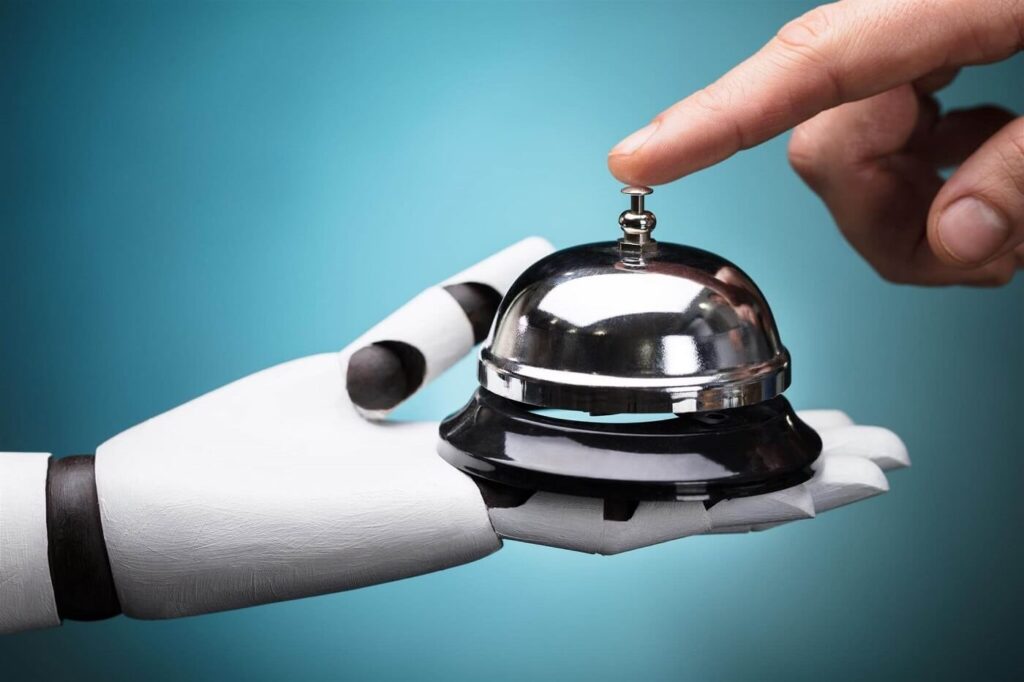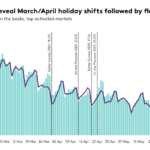Change is the only constant in the hospitality industry, and as we move into 2025, the landscape is set to evolve even further. With guest satisfaction and experience at the heart of success, hotel businesses must stay ahead of emerging trends that will shape the industry. This article delves into the key hospitality trends for 2025, offering insights and actionable recommendations to help leaders make strategic investments in technology, people, and processes.
The hospitality industry experienced a remarkable resurgence in 2024, approaching pre-pandemic travel levels with improved occupancy rates, daily rates, profitability, and RevPAR (Revenue per Available Room). This recovery marks not just a return to form but the dawn of a new era of growth and innovation.
Key Data Highlights
- Global Market Growth: The hospitality market reached $4.9 trillion in 2024.
- Economic Contribution: The industry’s GDP impact hit a record $11.1 trillion, constituting 10% of global GDP (WTTC).
- Traveler Numbers: Global tourism saw 1.1 billion travelers between January and September 2024, an 11% increase from 2023.
- Projected Growth: Travel and tourism are expected to grow at 5.8% annually from 2022 to 2032, outpacing global economic growth at 2.7%.
A significant driver behind this transformation is the emergence of new traveler segments, including Gen Alpha, who are beginning to influence family travel preferences. Additionally, the rise of wellness tourism, bleisure (business and leisure), and health tourism is reshaping hospitality offerings to meet evolving guest expectations.

Emerging Trends in Hospitality
1. Technology-First Hospitality Experience
As technology advances, guests expect seamless, tech-driven hotel experiences. Innovations such as virtual concierges, mobile check-ins, and dedicated hotel apps are redefining convenience and personalization. Heavy investments in cloud technology and data security are enabling advanced technologies that were once considered futuristic, such as AI and predictive analytics.
Deep Dive:
- Virtual Concierges: These AI-powered systems provide guests with 24/7 assistance, answering queries and providing recommendations without the need for human intervention. This not only enhances guest satisfaction but also frees up staff to focus on more personalized interactions.
- Staff-less Check-Ins: Guests can bypass traditional check-in lines, allowing for a smoother arrival experience. This technology also enables features like keyless entry, where guests can use their smartphones to access their rooms.
- Hotel Apps: Customized apps can offer guests tailored services, from room service orders to spa bookings, all at their fingertips. The integration of these apps with loyalty programs can further enhance the guest experience.
Recommendations for Hoteliers:
- Invest in Technology: Allocate budget for upgrading technology platforms that enhance guest experience, such as hotel kiosks, mobile apps and virtual concierge services.
- Training Staff: Ensure staff are trained to utilize these technologies effectively to enhance guest interactions.
Guide for the Top 10 Hotel Kiosk Alternatives: Functionality, Pricing, and Competitive Advantages
2. Smart Technology Integration
Smart rooms equipped with digital controls for lighting, temperature, and entertainment will become essential to attract tech-savvy travelers, particularly Gen Z. The integration of IoT devices will streamline operations while enhancing guest comfort.
Deep Dive:
- IoT Devices: Hotels are increasingly adopting smart thermostats, lighting systems, and entertainment options that guests can control via their devices. This not only adds convenience but also allows for energy efficiency.
- Voice-Controlled Systems: Guests can use voice commands to adjust room settings, order services, or obtain information about the hotel and its amenities, enhancing the overall experience.
- Predictive Maintenance: AI can analyze data from these smart devices to predict when maintenance is needed, reducing downtime and ensuring a seamless guest experience.
Recommendations for Hoteliers:
- Implement IoT Solutions: Invest in IoT devices to optimize room settings and energy efficiency.
- Promote Smart Features: Market smart room features to attract tech-savvy guests.
3. Seamless Online Experiences
A seamless online experience is crucial for attracting guests. From social media engagement to integrated booking systems, hotels must ensure that their online presence is cohesive and user-friendly. A mobile-first approach is no longer optional but a necessity.
Deep Dive:
- Integrated Booking Systems: A streamlined booking process across various platforms (OTAs, hotel websites, social media) ensures that guests can easily find and book their desired accommodations.
- Social Media Engagement: Hotels must actively engage with potential guests on platforms like Instagram and TikTok, showcasing their unique offerings and creating a sense of community.
- User Experience (UX) Design: Investing in UX design for websites and apps can significantly improve the customer journey, making it easier for guests to navigate and complete bookings.
Recommendations for Hoteliers:
- Enhance Website UX: Regularly update the website to ensure a smooth booking process.
- Utilize Social Media: Engage with potential guests on social media, showcasing unique offerings and encouraging direct bookings.
4. Holistic Wellness Offerings

As wellness becomes a priority for many travelers, hotels are expected to offer wellness services such as in-room massages, yoga classes, and healthy dining options. A focus on holistic living will become integral to the guest experience.
Deep Dive:
- Wellness Programs: Hotels can provide comprehensive wellness packages that include fitness classes, spa treatments, and healthy meal options, catering to guests looking for rejuvenation.
- Mindfulness Spaces: Creating serene environments for meditation or relaxation can enhance the guest experience, allowing them to unwind fully during their stay.
- Partnerships with Local Wellness Experts: Collaborating with local wellness practitioners can offer guests unique experiences, such as guided nature walks or wellness workshops.
Recommendations for Hoteliers:
- Create Wellness Packages: Develop comprehensive wellness packages that include various services and experiences.
- Partner with Local Wellness Experts: Collaborate with local wellness providers to offer unique experiences.
5. Hyper-Personalization
In 2025, hyper-personalization will be key. Whether it’s through tailored marketing messages or customized in-room experiences, hotels that focus on individual guest preferences will stand out. Features like pillow menus and personalized welcome gifts will enhance the guest experience.
Deep Dive:
- Data Analytics: Utilizing guest data to understand preferences and behaviors allows hotels to create customized experiences, from room settings to dining options.
- Personalized Marketing: Targeted emails and promotions based on past stays can significantly increase conversion rates and guest loyalty.
- Feedback Loops: Implementing systems for gathering guest feedback in real-time can help hotels adapt their offerings to meet evolving preferences.
Recommendations for Hoteliers:
- Leverage Guest Data: Use analytics to understand guest preferences and tailor offerings accordingly.
- Feedback Mechanisms: Implement systems for gathering real-time feedback to continuously improve personalization efforts.
6. Sustainability Initiatives
With climate change becoming a pressing global issue, eco-friendly practices will continue to rise. Guests are increasingly seeking hotels that prioritize sustainability through energy-efficient operations, eco-friendly amenities, and sustainable sourcing.
Deep Dive:
- Green Certifications: Hotels can pursue certifications (like LEED or Green Key) to showcase their commitment to sustainability, attracting eco-conscious travelers.
- Sustainable Sourcing: Using locally sourced ingredients in restaurants and bars not only supports local economies but also reduces the carbon footprint associated with food transport.
- Waste Reduction Programs: Implementing initiatives such as composting, recycling, and reducing single-use plastics can greatly enhance a hotel’s sustainability profile.
Recommendations for Hoteliers:
- Pursue Green Certifications: Obtain certifications to demonstrate commitment to sustainability.
- Educate Guests: Communicate sustainability efforts to guests, enhancing their experience while promoting eco-friendly practices.
7. Bleisure Travel Growth

The blending of business and leisure travel will continue to gain traction. Hotels must prepare to cater to the unique needs of guests traveling for both work and leisure, offering flexible spaces and amenities that appeal to this segment.
Deep Dive:
- Flexible Meeting Spaces: Hotels can create adaptable meeting rooms that can easily transition into leisure spaces for relaxation or socializing after business hours.
- Work-Life Balance Amenities: Offering amenities like co-working spaces, high-speed internet, and business centers can attract bleisure travelers looking to blend work with leisure.
- Customized Packages: Developing packages that cater specifically to bleisure travelers, including discounts for extended stays or leisure activities, can enhance appeal.
Recommendations for Hoteliers:
- Develop Flexible Spaces: Create adaptable meeting rooms that can transition into leisure spaces.
- Market to Bleisure Travelers: Develop targeted marketing campaigns highlighting amenities and packages for bleisure travelers.
8. Data-Driven Decision Making
The hospitality industry will increasingly rely on big data and AI to enhance guest experiences. Real-time analytics will allow hotels to adapt their offerings based on guest preferences and behaviors, optimizing marketing strategies and improving operational efficiency.
Deep Dive:
- Real-Time Analytics: Utilizing tools to analyze guest behavior and preferences can help hotels tailor their services and marketing efforts more effectively.
- Predictive Modeling: AI can forecast trends and guest needs, allowing hotels to proactively adjust their offerings to meet demand.
- Performance Metrics: Implementing robust metrics for measuring guest satisfaction and operational efficiency can lead to continuous improvement.
Recommendations for Hoteliers:
- Invest in Analytics Tools: Implement data analytics tools to track guest behavior and preferences.
- Train Staff on Data Usage: Ensure staff are trained to interpret data and adjust strategies accordingly.
9. Influencer Marketing and Social Media Engagement
As Gen Z and Gen Alpha become key travel demographics, leveraging influencer marketing and engaging with customers on platforms like TikTok and Instagram will be vital. Authentic connections through social media can enhance brand visibility and attract new guests.
Deep Dive:
- Niche Influencers: Partnering with influencers who align with a hotel’s brand values can create authentic connections and drive engagement.
- User-Generated Content: Encouraging guests to share their experiences on social media can amplify a hotel’s reach and create a sense of community.
- Engaging Content Creation: Developing engaging, visually appealing content that showcases the hotel experience can capture the attention of potential guests.
Recommendations for Hoteliers:
- Identify Relevant Influencers: Partner with influencers who align with your brand values and have a genuine connection with their audience.
- Encourage User-Generated Content: Create campaigns that encourage guests to share their experiences on social media.
10. Enhanced Safety and Hygiene Protocols
Post-pandemic, guests remain concerned about safety and hygiene. Hotels must communicate their cleanliness protocols effectively to reassure guests, making hygiene a central part of their marketing strategies.
Deep Dive:
- Transparent Communication: Clearly communicating hygiene practices through websites, social media, and in-room materials can enhance guest confidence.
- Regular Audits: Conducting regular audits of cleanliness and safety measures can ensure compliance and boost staff morale.
- Guest Feedback: Actively seeking guest feedback on cleanliness can help hotels continuously improve and adapt their practices.
Recommendations for Hoteliers:
- Communicate Hygiene Practices: Clearly articulate hygiene measures through various channels to build guest confidence.
- Regular Staff Training: Conduct regular training on cleanliness and safety protocols to ensure compliance.
Trends Oriented Toward Business Growth
While all trends contribute to the overall guest experience, several are particularly oriented toward driving business growth:
- Data-Driven Decision Making: Leveraging data analytics not only enhances guest experiences but also allows for smarter business decisions, optimizing revenue management and marketing strategies.
- Hyper-Personalization: By creating tailored experiences, hotels can increase guest satisfaction and loyalty, leading to repeat business and positive word-of-mouth referrals.
- Sustainability Initiatives: As eco-conscious travelers become more prevalent, hotels that prioritize sustainability can differentiate themselves in a competitive market, attracting a growing segment of environmentally aware guests.
- Technology Integration: Investing in technology such as hotel kiosks, mobile apps, AI, and IoT not only improves operational efficiency but also enhances the guest experience, leading to higher satisfaction and increased bookings.
- Bleisure Travel Growth: Catering to the bleisure segment opens up new revenue streams, as hotels can attract guests who are willing to spend more on both business and leisure activities.
Mobile Keys vs Hotel Self-Service Kiosks: A Comparative Analysis
Preparing for the Future of Hospitality
For industry professionals, adapting to these hospitality trends is essential for success in 2025 and beyond. Hotels that leverage technology, focus on sustainability, and prioritize personalization will be well-positioned for operational success.
By staying attuned to evolving consumer expectations and emerging technologies, hospitality leaders can create memorable guest experiences while gaining a competitive edge. The commitment to innovation, connection, and unforgettable experiences will define the hospitality landscape in the years to come.
As we embrace these trends, the hospitality industry stands poised for a dynamic future, shaped by the needs and desires of the modern traveler.



